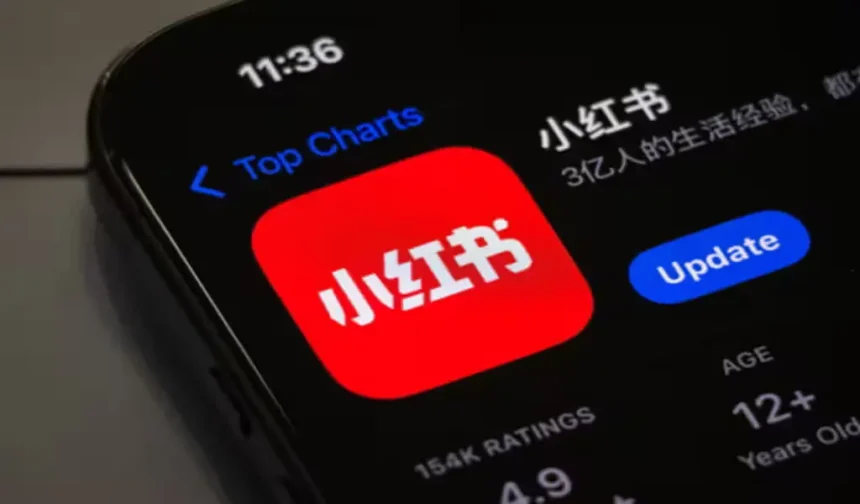As the potential ban on TikTok in the United States looms, young Americans turn to the Chinese social media platform Xiaohongshu, seeking a similar experience.
In recent days, the app has achieved the top position in iOS and Google Play stores in the United States. This comes as users prepare for the potential ban of TikTok on national security grounds, which is set to take effect on Sunday unless Chinese parent company ByteDance divests its ownership.
Lemon8, a Chinese lifestyle application owned by ByteDance, has been ranked as the second most downloaded app.
Xiaohongshu, compared to Instagram in China, enables users to share text, videos, and photographs. It is renowned for its predominantly female user base.
Despite having approximately 300 million monthly active users, Xiaohongshu’s user base is considerably smaller than that of other prominent applications in China, including Sina Weibo and WeChat, which account for over 1.2 billion users.
The app’s “Discover” tab now features videos from new users, many identifying as “TikTok refugees” seeking assistance with “RedNote,” the app’s new name in the United States.
Greetings. I am no longer aware of the situation. Americans are arriving in this region. I apologize for any animosity you may harbour toward us. “I assure you that we will make every effort,” stated a female user who identified herself as “Star404” in a brief video uploaded on Tuesday.
“There’s no reason to worry; success is within our reach.” This outshines TikTok by a large margin. Still, Meta is not part of this. I can explore Instagram reels to some extent, but there’s no hope for Facebook or YouTube videos. “That’s never going to happen,” she stated.
Ryan Broderick, the author of Garbage Day, a newsletter that covers the internet, has not overlooked the absurdity of numerous users transitioning from one Chinese-owned app to another.
Broderick remarked to Al Jazeera, “It is certainly amusing that American teenagers are protesting the impending TikTok ban by employing a culturally more Chinese app.”
Xiaohongshu’s Monetization Model and Differences with TikTok
“At present, RedNote does not appear to be siloing Chinese content or requiring users to have a Chinese phone number. Consequently, the app has become a hub of cultural chaos, an experience that has never occurred on TikTok,” he stated.
In just 24 hours, “Star404’s” post garnered over 4,000 comments, most of which were from Chinese users who welcomed her to the platform or made light of the language barriers.
Another user, “Fern,” expressed her appreciation for the influx of Chinese followers who greeted her upon joining the platform.
“We need to discuss the fact that you guys have viewed my video about moving to Rednote by 50,000 new followers in less than 24 hours.” “You are all insane,” she exclaimed.

“However, I am extremely grateful for the assistance you have provided.
Although the app’s proprietor is reportedly in an awkward position, the surge in American users has amused many Chinese Xiaohongshu users.
On Tuesday, PConline, a Chinese media outlet, reported that Xiaohongshu employees have been directed to refrain from “discussing, promoting, and sharing” news regarding their new US user base. The article cited sources within the company.
“The sword of Damocles that hangs over Xiaohongshu’s head is this wave of traffic.” The report stated that the risks for Xiaohongshu, which inexplicably received this traffic, far outweigh the opportunities.
Regulatory complications are among the potential hazards. Chinese social media platforms typically require users to register with a Chinese phone number, and content is subject to government censorship.
Yiwen Lu, a researcher at ChinaTalk, a newsletter and podcast focusing on Chinese technology, explains that Chinese technology companies frequently develop domestic and international versions of their applications.
TikTok is an international variant of Douyin, whereas ByteDance intentionally developed Lemon8 for the international market.
Currently, the content on Xiaohongshu is identical to that of Chinese and American consumers.
Nevertheless, certain users have reminded their American compatriots that the application is accompanied by its regulations.
“A friendly reminder: Please refrain from discussing sensitive subjects, including politics, religion, and drugs, on Chinese social media platforms!” One user wrote under Star404’s post, “Please comply with the One China policy and refrain from engaging in pornography, gambling, or drug use.”
“[You] are permitted to comment on any topic here, with the exception of the history of China from 1949 to 2025,” stated another user.
Xiaohongshu’s Livestream Shopping Surge: A Trend from China to the US
Lu from ChinaTalk noted that American users will struggle to replicate their TikTok experience on the app, especially regarding content monetization.
“The monetization models are highly variable; XHS is positioned as a shopping platform, and the majority of creators generate revenue through paid partnerships.”
Lu informed Al Jazeera that this distinction presents a challenge for creators in the short term as they attempt to completely transition their work and income streams to XHS.
In recent months, livestream purchasing, a highly popular form of e-commerce in China, has surged in popularity on Xiahongshu.
In the United States, many TikTok users continue purchasing through links to Amazon or the shopping platform LTK, which stands for “Like to Know.”
Lu and Broderick expressed doubts about the sustainability of the surge in US users, given that many joined in protest and the platforms varied.
However, Broderick emphasized that the migration to Xiaohongshu should be a cautionary tale to the US government and Big Tech.
“It is a humorous approach to hopefully convince US politicians that Chinese applications are encroaching on the United States, regardless of their inclination,” he stated.
“Similarly, it is an effective method of informing Silicon Valley that their products are stagnating and that no amount of federal bans will rekindle the interest of young people in Meta products.”

Salman Ahmad is known for his significant contributions to esteemed publications like the Times of India and the Express Tribune. Salman has carved a niche as a freelance journalist, combining thorough research with engaging reporting.














